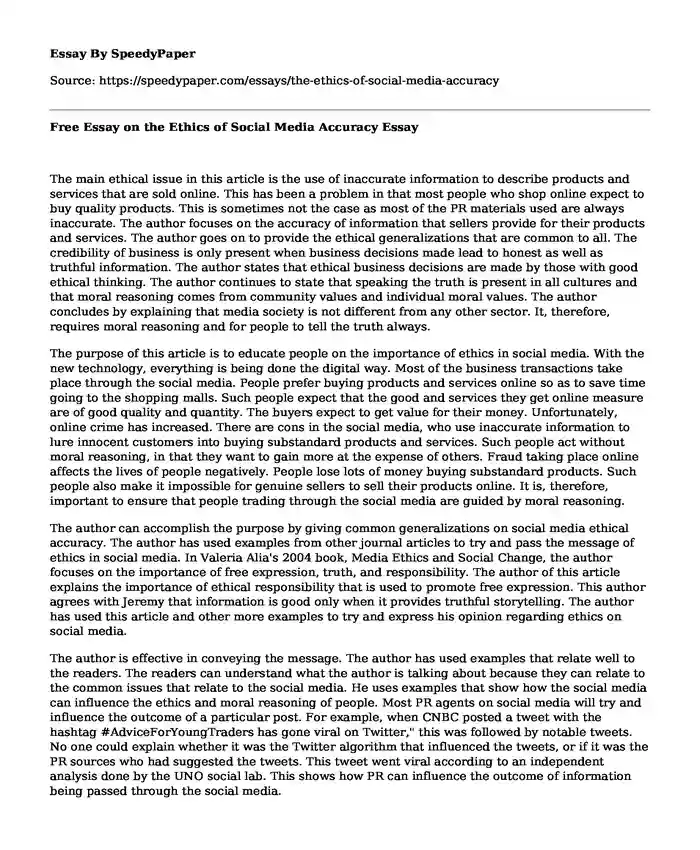
| Type of paper: | Essay |
| Categories: | Ethics Social media |
| Pages: | 4 |
| Wordcount: | 839 words |
The main ethical issue in this article is the use of inaccurate information to describe products and services that are sold online. This has been a problem in that most people who shop online expect to buy quality products. This is sometimes not the case as most of the PR materials used are always inaccurate. The author focuses on the accuracy of information that sellers provide for their products and services. The author goes on to provide the ethical generalizations that are common to all. The credibility of business is only present when business decisions made lead to honest as well as truthful information. The author states that ethical business decisions are made by those with good ethical thinking. The author continues to state that speaking the truth is present in all cultures and that moral reasoning comes from community values and individual moral values. The author concludes by explaining that media society is not different from any other sector. It, therefore, requires moral reasoning and for people to tell the truth always.
The purpose of this article is to educate people on the importance of ethics in social media. With the new technology, everything is being done the digital way. Most of the business transactions take place through the social media. People prefer buying products and services online so as to save time going to the shopping malls. Such people expect that the good and services they get online measure are of good quality and quantity. The buyers expect to get value for their money. Unfortunately, online crime has increased. There are cons in the social media, who use inaccurate information to lure innocent customers into buying substandard products and services. Such people act without moral reasoning, in that they want to gain more at the expense of others. Fraud taking place online affects the lives of people negatively. People lose lots of money buying substandard products. Such people also make it impossible for genuine sellers to sell their products online. It is, therefore, important to ensure that people trading through the social media are guided by moral reasoning.
The author can accomplish the purpose by giving common generalizations on social media ethical accuracy. The author has used examples from other journal articles to try and pass the message of ethics in social media. In Valeria Alia's 2004 book, Media Ethics and Social Change, the author focuses on the importance of free expression, truth, and responsibility. The author of this article explains the importance of ethical responsibility that is used to promote free expression. This author agrees with Jeremy that information is good only when it provides truthful storytelling. The author has used this article and other more examples to try and express his opinion regarding ethics on social media.
The author is effective in conveying the message. The author has used examples that relate well to the readers. The readers can understand what the author is talking about because they can relate to the common issues that relate to the social media. He uses examples that show how the social media can influence the ethics and moral reasoning of people. Most PR agents on social media will try and influence the outcome of a particular post. For example, when CNBC posted a tweet with the hashtag #AdviceForYoungTraders has gone viral on Twitter," this was followed by notable tweets. No one could explain whether it was the Twitter algorithm that influenced the tweets, or if it was the PR sources who had suggested the tweets. This tweet went viral according to an independent analysis done by the UNO social lab. This shows how PR can influence the outcome of information being passed through the social media.
The author is right by stating the fact that PR and other inaccurate information posted on social media affect the ethics of social media accuracy. It is true that many reap where they have not planted by posting inaccurate information that lures unsuspecting customers to buying products and services with low quality. For example, a person posts a product and asks others to comment on how good the product is, even though it is of poor quality. Unsuspecting customers end up buying such products. Little has been done by the social media platforms to ensure that social media fraud is eliminated.
This article is highly recommended because it can enlighten the ethical issues that are facing the social media. It can show the impact that social media decisions have on people. Social media according to the author is becoming a must-know for all citizens. The younger generation has the technological skills, but they often misuse those skills for their selfish benefits. The older generation, on the other hand, can offer experience and understanding on ethical issues affecting the accuracy of social media ethics. Social media is just like any other media, and so the truth should always be told at all times.
References
Jeremy, H (2015). The Ethics of Social Media Accuracy. The Blog.http://www.huffingtonpost.com/jeremy-harris-lipschultz/the-ethics-of-social-media_b_7489280.html
Cite this page
Free Essay on the Ethics of Social Media Accuracy. (2019, Jun 25). Retrieved from https://speedypaper.net/essays/the-ethics-of-social-media-accuracy
Request Removal
If you are the original author of this essay and no longer wish to have it published on the SpeedyPaper website, please click below to request its removal:
- Free Essay Sample on PPM Tools in Growth Management
- Free Essay Sample on Retirement Depression
- Strategic Management Essay Example
- Free Essay about Informatics and Computing
- Essay Sample Comprising the Narrative of the Life of Frederick Douglass
- Paper Example - Global Business and Sustainability
- Essay Sample on Starbucks' Human Resource Management Practices
Popular categories




